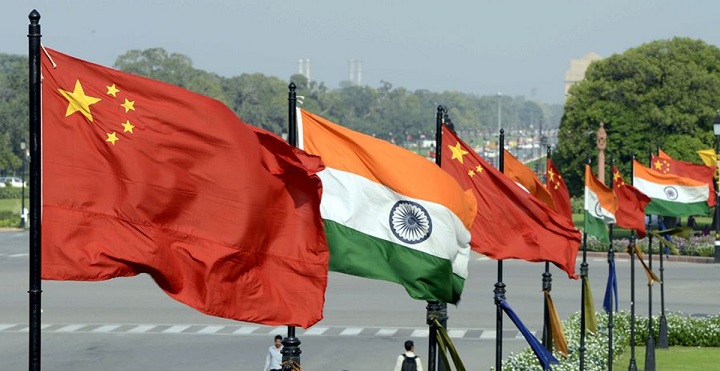
As India announced on Monday new skirmishes with Chinese troops took place at Nathu La, in the state of Sikkim, Beijing declared in would launch its third aircraft carrier this year. In the past days, PLA (People’s Liberation Army) fighters and submarines violated Taiwan’s airspace and waters. Is China more aggressive, marching towards a military conflict with its neighbors?
Is it all western provocative propaganda and China is under siege? If so, is it now going to be cordoned off and blocked? Many in China directly or indirectly voice this concern, looking at America’s recent policies vis-à-vis Beijing. And actual war is no longer impossible[1]. Then if so, where could this actually occur?
But to understand the situation, we have to take a step back.
The US as a Lubricant
In 2007 I noted[2] that China was a prisoner of its own geography, restricted by some 20 countries and territories that contained and bound all its policies. In this situation, security in a very broad sense was provided by the United States, which was the political and military lubricant of the situation.
Without the American lubricant, the Chinese situation could go badly not overnight, but over a period of time, since every single country or territory surrounding China had (and has) issues with it and its rise.
After the 2008 financial crisis, China gradually became oblivious to this predicament, and after 2009, the United States gradually decreased the amount of lubricant in China’s political and strategic neighborhood. The result, in the next decade, was that relations around China became increasingly difficult. All the issues that had been hidden or ironed out and smoothed by the lubricant came to the surface.
What China should have done was carry on using the US lubricant and add its own lubricant, making sure it would agree with the old lubricant and the engine. With time and trust, the lubricant proportions could have been inverted. This didn’t happen and now it’s too late.
China realized that and its answer was to launch the Belt and Road Initiative (BRI). The BRI is many things, including an attempt to create and provide its own political lubricant. The underlying idea was to turn its geographical quandary to its own advantage, stretching its Western reach onto Europe and creating a Eurasian bridge.
However, this was perhaps poorly conceived. The Belt and Road Initiative was, using an analogy, substituting the American lubricant for the Chinese one overnight in the same engine (i.e., global political situation). The result was that the old lubricant stopped working at increasing speed (being driven out), and the new lubricant was not working well and fast enough. In a nutshell, this is the predicament now.
China’s political and soft-power muscle with its neighbors and in the world is no match for the old political and strategic lubricant of the United States, and yet the United States doesn’t provide the same utility it used to provide to China 15 years ago.
In this situation, everything becomes stuck with greater friction and conflict, and war can explode anywhere.
A Chinese loop
Then China is caught in a loop. Without American lubricant, its frictions surge; therefore China makes more weapons to safeguard itself. Neighbors see it as an objective threat and arm themselves even more, in a vicious circle of self-fulfilling prophesies. The end result is that China now has flashpoints all around its borders. With Taiwan, with Japan, on the South China Sea, with India, and possibly also with Mongolia and some of the former Soviet Central Asian “-stans.”
As for Russia, border friction is hidden behind the veil of the new “entente cordiale” between Beijing and Moscow. Yet both sides know that this entente could be undone overnight, as both countries have a long history of turning on each other.
Then, if there is to be a war, a strategic answer for China would be: to have it where it would be more convenient for Beijing. The real Grand Strategy for China would be to avoid war, as Beijing would suffer badly for it, whether it wins or loses. China in fact developed thanks to 40 years of total peace—to enter a time of increased tensions is a leap into the unknown. Yet, some may argue in China and abroad that a time of increased tensions could encourage a domestic agenda to bring greater internal order in China and among Chinese adversaries and enemies, and then one may be tempted to go for increased tensions.
But where exactly could a conflict flare up? Let’s make a first speculative list.
Of course, one of the main points is Taiwan. Here in the past months there have been growing tensions because, on the one hand, Taiwan authorities may see this as a golden opportunity to gain more international recognition, beef up political and military independence from China, and break away from the drift toward unification with mainland China, which had been increasing in the past 40 years.
Conversely, China, concerned and worried about these “splittists,” could try to scare Taiwan (the island officially part of China but de facto independent) into submission, and scare tactics could easily get out of control and evolve into a full-fledged military fight. In this, the United States, and maybe even Japan and other countries, may wish to get involved because a growing assertive China gaining control over Taiwan island and the Taiwan Strait would dramatically change the balance of power in the region.
Another flash point is still the Senkaku Islands, the group of rocks and islands claimed by both China and Japan. Here for almost two decades, tempers have gone up and down but never really cooled off. In this situation, again, an error—a mistake by Japanese forces or the Chinese navy or fishing boats—could flare up and spiral into something far more dangerous.
The South China Sea presents a similar scenario only compounded into N possibilities. In fact, China contests the waters with six neighboring countries and territories and with the United States and Western forces.
The control of that corner of the ocean is crucial for global trade and the economy. Some 40% of global trade goes through there, plus the majority of import-exports for Japan and South Korea. For China, it is an issue of national “face” because losing that part of the world could trigger a domino effect that causes it to lose more territories, giving up the Senkaku to Japan or Taiwan. Here with a growing presence of navies and air forces from all over the world, something may go wrong, and there could be an escalation.
Another important flash point is the border between China and India. India has a 60-year-old open wound because of the lost war with China. Logistics on both sides of the frontier have been improving. China has railways and highways that link the border to the industrial heartland of China. India has improved its weaker position there, and it now has greater support from a number of countries, including the United States, Japan, and Vietnam.
Here the issue is extremely complicated. Also, there could be a temptation for Pakistan to use a flaring of hostilities between China and India to start a war with India on the western border. On the other hand, India may be drawn to prove its mettle and its loyalty to the United States and Japan by starting a war there, as China started a war with Vietnam in 1979.
In return for its participation in this war, although it was a military failure, China received a bounty of benefits from America, including a green light for technological transfers and low tariffs for export to the United States. These benefits started the industrial revolution and development of China. This snowballed into the first moment of globalization, and brought China where it is presently.
Now India may want to emulate that experience, and no matter if it wins or loses a military engagement with China, India may look for high-level rewards from the United States and the Western world.
India could be better off than China in collecting the benefits of limited war because India is a democracy, has an Anglo-Saxon legal system, and its local elites are fluent in English. Its population is the same size as China’s, but much younger, and therefore with greater potential. India could then be, thanks to a war, a China on steroids, plus more easily integrated into the Western world.
Other flash points not to be underestimated could be Mongolia or Kazakhstan, which have a history of suspicion of China. Win or lose, fights there could benefit China by scaring other neighboring countries into order from the American point of view or scaring these countries into a tighter embrace with the United States. For these countries the incentive would be to get away from the vice between Russia and China and find some level of autonomy.
Another flash point is the old situation with North Korea, where the Kim dynasty is looking for the limelight and hopes to garner dividends from heightened tension on the peninsula, while being restrained by China from time to time.
Direct or proxy war
In almost all of these scenarios, China is involved directly. That is, in the case of fighting with India, the navy, air force, and land forces from China could be directly involved. Conversely, forces from the United States could be marginally tangled or keep aloof, waiting for the dividends of the fight.
In only one scenario would the positions be reversed, and the United States would have to be directly fall into a quagmire, whereas forces from China could be marginally or not occupied at all. That scenario is in North Korea. History would repeat itself here. In the first Cold War, the 1950 war in Korea triggered the full-fledged “cold” conflict between the USSR, China, and its allies against the United States.
Now Chinese strategists might think if war really is impossible to avoid, it would be better to have a conflict starting on the Korean peninsula, where their forces can keep a distance and see how the United States and its allies are performing. Politically, a war in Korea would be extremely sensitive because in all these scenarios South Korea tries to keep a political balance between the United States and China.
Of course, this balance doesn’t amount to neutrality or siding with China. But so far Seoul has been less militarily and politically aggressive toward China than other neighboring countries. A war in the Korean peninsula would necessarily change the position of South Korea, and China would lose practically an important point of reference in the region.
Conversely, from the point of view of the United States, it would be better if China tripped on a wire in one of the other areas, where the American military wouldn’t have to be caught so directly.
There is also another possible repeat of the old Cold War scenario – a proxy war between China and the United States in a third country. For instance, Iran could be encouraged or feel encouraged to start a direct or indirect conflict with some of its neighbors that side with the United States.
If that thinking sinks in, we would have a very complex situation because proxy wars could be started all over the world. Interests of China and the USA and the western world collide all over the globe and a number of countries far from China have been openly sympathetic to Beijing. Nations like Cuba or Venezuela, which are officially rather hostile to the United States, but actually do not take sides, could be drawn into a conflict. This could expand the space of conflict to every corner of the planet.
There is no end to this thinking. All in all, if the logic of war is not drastically removed from the equation, if a creative new solution is not found, the slide into a military fight could become stronger, and with no political brakes in place, as no side admits officially there is a Cold War going on, the possibility of great errors could become very likely. This is the bad news.
The good news is that no shot has been fired yet, and there is still time to shelve the guns, but something big and creative must take place.
[1] See http://www.settimananews.it/informazione-internazionale/us-china-war-real-possibility/#comments
[2] See The Blessing of China’s Threat in my “China. In the Name of Law” https://www.amazon.com/China-Global-Historia-magistra-goWare-ebook/dp/B01BLCOYE8






Thank you for another brilliant analysis. I was so impressed with this analysis and it’s description of Global power balances I that I have forwarded it to friends and family with comment.
Respectfully, Paul Dragoumis